| Listing 1 - 10 of 125 | << page >> |
Sort by
|
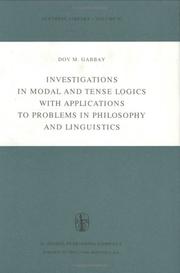
ISBN: 9027706565 9401014558 9401014531 9789027706560 Year: 1976 Volume: 92 Publisher: Dordrecht: Reidel,
Abstract | Keywords | Export | Availability | Bookmark
 Loading...
Loading...Choose an application
- Reference Manager
- EndNote
- RefWorks (Direct export to RefWorks)
Linguistics --- Mathematical logic --- Modality (Logic) --- Semantics (Philosophy) --- Grammar, Comparative and general --- Intension (Philosophy) --- Logical semantics --- Semantics (Logic) --- Semeiotics --- Significs --- Syntactics --- Unified science --- Language and languages --- Logic, Symbolic and mathematical --- Logical positivism --- Meaning (Psychology) --- Philosophy, Modern --- Semiotics --- Signs and symbols --- Symbolism --- Analysis (Philosophy) --- Definition (Philosophy) --- Modal logic --- Logic --- Nonclassical mathematical logic --- Bisimulation --- Comparative grammar --- Grammar --- Grammar, Philosophical --- Grammar, Universal --- Philosophical grammar --- Philology --- Grammar, Comparative --- Grammar, Comparative and general. --- Modality (Logic). --- Semantics (Philosophy).
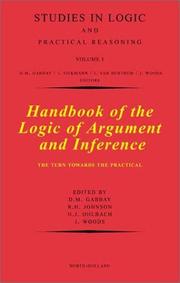
ISBN: 9780444506504 0444506500 9786611781415 128178141X 0080532918 9780080532912 6611781412 Year: 2002 Volume: v. 147 Publisher: Amsterdam Boston North Holland/Elsevier
Abstract | Keywords | Export | Availability | Bookmark
 Loading...
Loading...Choose an application
- Reference Manager
- EndNote
- RefWorks (Direct export to RefWorks)
The Handbook of the Logic of Argument and Inference is an authoritative reference work in a single volume, designed for the attention of senior undergraduates, graduate students and researchers in all the leading research areas concerned with the logic of practical argument and inference. After an introductory chapter, the role of standard logics is surveyed in two chapters. These chapters can serve as a mini-course for interested readers, in deductive and inductive logic, or as a refresher. Then follow two chapters of criticism; one the internal critique and the other the empirical critique. The first deals with objections to standard logics (as theories of argument and inference) arising from the research programme in philosophical logic. The second canvasses criticisms arising from work in cognitive and experimental psychology. The next five chapters deal with developments in dialogue logic, interrogative logic, informal logic, probability logic and artificial intelligence. The last chapter surveys formal approaches to practical reasoning and anticipates possible future developments. Taken as a whole the Handbook is a single-volume indication of the present state of the logic of argument and inference at its conceptual and theoretical best. Future editions will periodically incorporate significant new developments.
Logica. --- Argumentatie. --- Logic, Symbolic and mathematical. --- Logique symbolique et mathématique --- Logique mathématique --- Logic, Symbolic and mathematical --- 681.3*F41 --- Algebra of logic --- Logic, Universal --- Mathematical logic --- Symbolic and mathematical logic --- Symbolic logic --- Mathematics --- Algebra, Abstract --- Metamathematics --- Set theory --- Syllogism --- Mathematical logic: computability theory; computational logic; lambda calculus; logic programming; mechanical theorem proving; model theory; proof theory;recursive function theory--See also {681.3*F11}; {681.3*I22}; {681.3*I23} --- 681.3*F41 Mathematical logic: computability theory; computational logic; lambda calculus; logic programming; mechanical theorem proving; model theory; proof theory;recursive function theory--See also {681.3*F11}; {681.3*I22}; {681.3*I23}
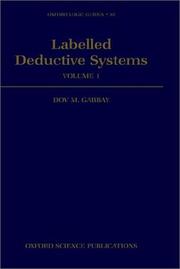
ISBN: 0198538332 9780198538332 Year: 1996 Volume: 33 Publisher: Oxford: Clarendon,
Abstract | Keywords | Export | Availability | Bookmark
 Loading...
Loading...Choose an application
- Reference Manager
- EndNote
- RefWorks (Direct export to RefWorks)
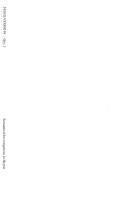
ISBN: 9027712026 9048183626 9401729778 9789027712028 Year: 1981 Volume: 148 Publisher: Dordrecht: Reidel,
Abstract | Keywords | Export | Availability | Bookmark
 Loading...
Loading...Choose an application
- Reference Manager
- EndNote
- RefWorks (Direct export to RefWorks)
Intuitionistic mathematics --- Heyting, A --- Constructive mathematics --- Mathematics --- Heyting, A. --- Intuitionistic mathematics. --- Heyting, Arend, --- Heyting, A - (Arend), - 1898 --- -Intuitionistic mathematics --- -Intuitionistic mathematics. --- Heyting, A - (Arend), - 1898-
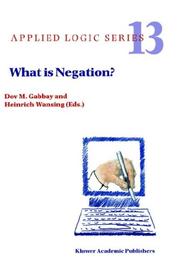
ISBN: 0792355695 9780792355694 9048151694 9401593094 Year: 1999 Volume: 13 Publisher: Dordrecht: Kluwer Academic Publishers,
Abstract | Keywords | Export | Availability | Bookmark
 Loading...
Loading...Choose an application
- Reference Manager
- EndNote
- RefWorks (Direct export to RefWorks)
The notion of negation is one of the central logical notions. It has been studied since antiquity and has been subjected to thorough investigations in the development of philosophical logic, linguistics, artificial intelligence and logic programming. The properties of negation-in combination with those of other logical operations and structural features of the deducibility relation-serve as gateways among logical systems. Therefore negation plays an important role in selecting logical systems for particular applications. At the moment negation is a 'hot topic', and there is an urgent need for a comprehensive account of this logical key concept. We therefore have asked leading scholars in various branches of logic to contribute to a volume on "What is Negation?". The result is the present neatly focused collection of re search papers bringing together different approaches toward a general characteri zation of kinds of negation and classifications thereof. The volume is structured into four interrelated thematic parts. Part I is centered around the themes of Models, Relevance and Impossibility. In Chapter 1 (Negation: Two Points of View), Arnon Avron develops two characteri zations of negation, one semantic the other proof-theoretic. Interestingly and maybe provokingly, under neither of these accounts intuitionistic negation emerges as a genuine negation. J. Michael Dunn in Chapter 2 (A Comparative Study of Various Model-theoretic Treatments of Negation: A History of Formal Negation) surveys a detailed correspondence-theoretic classifcation of various notions of negation in terms of properties of a binary relation interpreted as incompatibility.
Negation (Logic) --- Negation (Logic). --- Negative propositions --- Judgment (Logic) --- Logic. --- Artificial intelligence. --- Language and languages—Philosophy. --- Artificial Intelligence. --- Philosophy of Language. --- AI (Artificial intelligence) --- Artificial thinking --- Electronic brains --- Intellectronics --- Intelligence, Artificial --- Intelligent machines --- Machine intelligence --- Thinking, Artificial --- Bionics --- Cognitive science --- Digital computer simulation --- Electronic data processing --- Logic machines --- Machine theory --- Self-organizing systems --- Simulation methods --- Fifth generation computers --- Neural computers --- Argumentation --- Deduction (Logic) --- Deductive logic --- Dialectic (Logic) --- Logic, Deductive --- Intellect --- Philosophy --- Psychology --- Science --- Reasoning --- Thought and thinking --- Methodology --- Logique --- Négation (logique) --- Philosophie de la logique
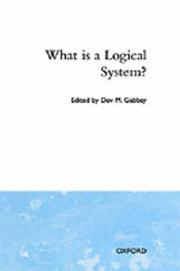
ISBN: 0198538596 9780198538592 Year: 1994 Publisher: Oxford : Clarendon Press,
Abstract | Keywords | Export | Availability | Bookmark
 Loading...
Loading...Choose an application
- Reference Manager
- EndNote
- RefWorks (Direct export to RefWorks)
Logic, Symbolic and mathematical --- Computer science --- Informatics --- Science --- Algebra of logic --- Logic, Universal --- Mathematical logic --- Symbolic and mathematical logic --- Symbolic logic --- Mathematics --- Algebra, Abstract --- Metamathematics --- Set theory --- Syllogism --- Computer science. --- Logic, Symbolic and mathematical. --- Logique symbolique et mathématique. --- Informatique. --- Logik. --- Mathematische Logik. --- Aufsatzsammlung. --- Logica. --- Systeemtheorie. --- Logica matematica. --- Logique.
Book
ISSN: 16112482 ISBN: 3642413889 3642413897 Year: 2013 Publisher: Heidelberg [Germany] : Springer,
Abstract | Keywords | Export | Availability | Bookmark
 Loading...
Loading...Choose an application
- Reference Manager
- EndNote
- RefWorks (Direct export to RefWorks)
This text offers an extension to the traditional Kripke semantics for non-classical logics by adding the notion of reactivity. Reactive Kripke models change their accessibility relation as we progress in the evaluation process of formulas in the model. This feature makes the reactive Kripke semantics strictly stronger and more applicable than the traditional one. Here we investigate the properties and axiomatisations of this new and most effective semantics, and we offer a wide landscape of applications of the idea of reactivity. Applied topics include reactive automata, reactive grammars, reactive products, reactive deontic logic and reactive preferential structures. Reactive Kripke semantics is the next step in the evolution of possible world semantics for non-classical logics, and this book, written by one of the leading authorities in the field, is essential reading for graduate students and researchers in applied logic, and it offers many research opportunities for PhD students.
Mathematics --- Physical Sciences & Mathematics --- Mathematical Theory --- Artificial intelligence. --- Computer science. --- Logic, Symbolic and mathematical. --- Logic. --- Argumentation --- Deduction (Logic) --- Deductive logic --- Dialectic (Logic) --- Logic, Deductive --- Algebra of logic --- Logic, Universal --- Mathematical logic --- Symbolic and mathematical logic --- Symbolic logic --- Informatics --- AI (Artificial intelligence) --- Artificial thinking --- Electronic brains --- Intellectronics --- Intelligence, Artificial --- Intelligent machines --- Machine intelligence --- Thinking, Artificial --- Mathematical logic. --- Computer Science. --- Mathematical Logic and Formal Languages. --- Artificial Intelligence (incl. Robotics). --- Mathematical Logic and Foundations. --- Algebra, Abstract --- Metamathematics --- Set theory --- Syllogism --- Intellect --- Philosophy --- Psychology --- Science --- Reasoning --- Thought and thinking --- Bionics --- Cognitive science --- Digital computer simulation --- Electronic data processing --- Logic machines --- Machine theory --- Self-organizing systems --- Simulation methods --- Fifth generation computers --- Neural computers --- Methodology --- Artificial Intelligence.
Book
ISBN: 904819587X 9786612995682 1282995685 9048195888 Year: 2010 Publisher: Dordrecht : Springer,
Abstract | Keywords | Export | Availability | Bookmark
 Loading...
Loading...Choose an application
- Reference Manager
- EndNote
- RefWorks (Direct export to RefWorks)
Legal theory, political sciences, sociology, philosophy, logic, artificial intelligence: there are many approaches to legal argumentation. Each of them provides specific insights into highly complex phenomena. Different disciplines, but also different traditions in disciplines (e.g. analytical and continental traditions in philosophy) find here a rare occasion to meet. The present book contains contributions, both historical and thematic, from leading researchers in several of the most important approaches to legal rationality. One of the main issues is the relation between logic and law: the way logic is actually used in law, but also the way logic can make law explicit. An outstanding group of philosophers, logicians and jurists try to meet this issue. The book is more than a collection of papers. However different their respective conceptual tools may be, the authors share a common conception: legal argumentation is a specific argumentation context.
Argumentation. --- Language and logic -- Congresses. --- Law -- Methodology -- Congresses. --- Logic -- Congresses. --- Law --- Philosophy & Religion --- Law, Politics & Government --- Law, General & Comparative --- Philosophy --- Methodology --- Sociological jurisprudence. --- Rationalism. --- Philosophy. --- Law. --- Political science. --- Logic. --- Artificial intelligence. --- Theories of Law, Philosophy of Law, Legal History. --- History of Philosophy. --- Political Science. --- Artificial Intelligence (incl. Robotics). --- Jurisprudence --- Knowledge, Theory of --- Religion --- Belief and doubt --- Deism --- Free thought --- Realism --- Law and society --- Society and law --- Sociology of law --- Sociology --- Law and the social sciences --- Philosophy (General). --- Artificial Intelligence. --- AI (Artificial intelligence) --- Artificial thinking --- Electronic brains --- Intellectronics --- Intelligence, Artificial --- Intelligent machines --- Machine intelligence --- Thinking, Artificial --- Bionics --- Cognitive science --- Digital computer simulation --- Electronic data processing --- Logic machines --- Machine theory --- Self-organizing systems --- Simulation methods --- Fifth generation computers --- Neural computers --- Administration --- Civil government --- Commonwealth, The --- Government --- Political theory --- Political thought --- Politics --- Science, Political --- Social sciences --- State, The --- Argumentation --- Deduction (Logic) --- Deductive logic --- Dialectic (Logic) --- Logic, Deductive --- Intellect --- Psychology --- Science --- Reasoning --- Thought and thinking --- Law—Philosophy. --- Mental philosophy --- Humanities --- Acts, Legislative --- Enactments, Legislative --- Laws (Statutes) --- Legislative acts --- Legislative enactments --- Legislation --- History. --- Legal history --- History and criticism

ISBN: 128178141X 9786611781415 0080532918 0444506500 Year: 2002 Publisher: Amsterdam ; Boston : North Holland/Elsevier,
Abstract | Keywords | Export | Availability | Bookmark
 Loading...
Loading...Choose an application
- Reference Manager
- EndNote
- RefWorks (Direct export to RefWorks)
The Handbook of the Logic of Argument and Inference is an authoritative reference work in a single volume, designed for the attention of senior undergraduates, graduate students and researchers in all the leading research areas concerned with the logic of practical argument and inference. After an introductory chapter, the role of standard logics is surveyed in two chapters. These chapters can serve as a mini-course for interested readers, in deductive and inductive logic, or as a refresher. Then follow two chapters of criticism; one the internal critique and the other the emp
Logic, Symbolic and mathematical. --- Mathematics. --- Math --- Science --- Algebra of logic --- Logic, Universal --- Mathematical logic --- Symbolic and mathematical logic --- Symbolic logic --- Mathematics --- Algebra, Abstract --- Metamathematics --- Set theory --- Syllogism
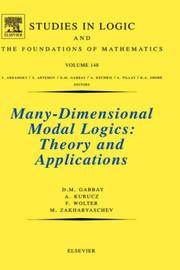
ISBN: 9780444508263 0444508260 9780080535784 008053578X 1281048518 9781281048516 9786611048518 Year: 2003 Publisher: Amsterdam ; Boston : Elsevier North Holland,
Abstract | Keywords | Export | Availability | Bookmark
 Loading...
Loading...Choose an application
- Reference Manager
- EndNote
- RefWorks (Direct export to RefWorks)
Modal logics, originally conceived in philosophy, have recently found many applications in computer science, artificial intelligence, the foundations of mathematics, linguistics and other disciplines. Celebrated for their good computational behaviour, modal logics are used as effective formalisms for talking about time, space, knowledge, beliefs, actions, obligations, provability, etc. However, the nice computational properties can drastically change if we combine some of these formalisms into a many-dimensional system, say, to reason about knowledge bases developing in time or moving objects.
Modality (Logic). --- Modality (logic) --- Modality (Logic) --- Modal logic --- Logic --- Nonclassical mathematical logic --- Bisimulation
| Listing 1 - 10 of 125 | << page >> |
Sort by
|

 Search
Search Feedback
Feedback About UniCat
About UniCat  Help
Help News
News